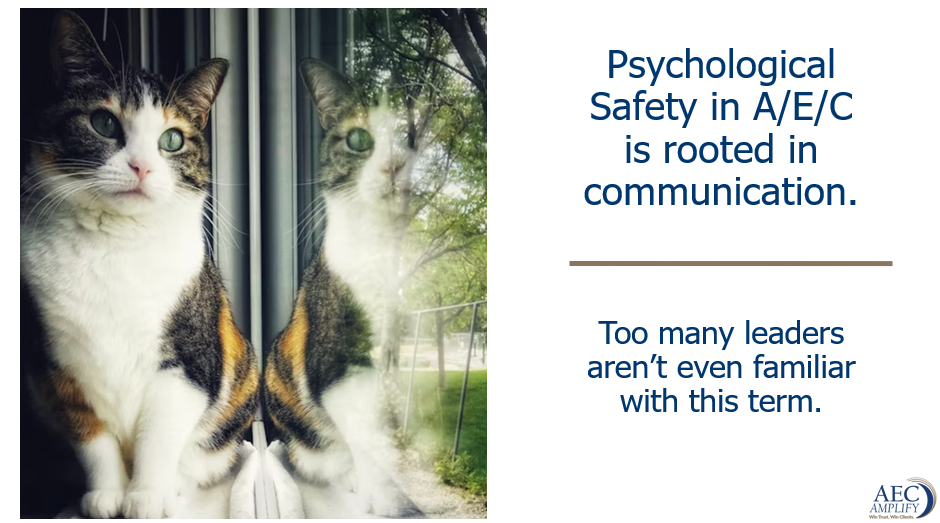Susan Young's
Amplify Blog
How to Get Noticed by Top A/E/C Executives

Communication tip for aspiring construction PMs and leaders:
Knowing the project lingo is good.
📈Knowing the PROFIT lingo is when C-suite execs start listening.
Speak their language and watch your career path transform.
The High Cost of Dysfunctional Teams

Communication tip:
Teamwork is your competitive advantage.
Here's the truth: A lack of trust amongst A/E/C teams brings dysfunction.
Messy interactions and communication breakdowns lead to misunderstandings, cost overruns, reworks, low morale, and labor shortages.
Successful leaders are willing to quickly and honestly address chaos to diffuse conflicts and keep projects on track.
How do you manage conflicts and dysfunctional teams?
Reach out if your team needs support.
You're Losing Because Your PMs Don't Know the Process

Back up the bus, A/E/C leaders.
Most newer project managers, estimators, and superintendents aren't familiar with the process of being shortlisted.
Still, you expect them to be confident and well-spoken in seller-doer interviews.
Let's lay a solid foundation for these pros so they have a deep understanding of business development.
When there's a lack of clarity, bids go to your competitors.
To avoid losing revenue, take the time to educate technical staff. 📈
They influence interview panels.
Confidence and business acumen are what owners and stakeholders look for when awarding bids.
What To Do When Employees Show Up To Collect a Paycheck

Collecting a paycheck.
If you've had a few jobs in your life, this phrase has likely crossed your mind.
Or fell off your tongue.
Going through the motions at work is frustrating and a waste of talent.
Leaders: Do you have employees who show up disengaged, collecting a paycheck rather than being eager to learn and contribute?
This disconnect isn't about people being lazy.
🚩They may feel like their voice doesn't matter.
🚩They may not believe their work is having an impact.
A/E/C leaders must know that lighting a spark to re-engage people is rooted in curiosity.
Ask team members what's getting in the way.
Ask them if they are clear on expectations.
More than 90% of the emerging leaders in my online training classes say they're unsure how their daily work fits into the bigger picture of the firm.
It's the 30,000-foot view and the 3,000-foot view.
Without clarity, people show up to collect paychecks.
Clarity brings a sense of purpose.
🎯And it's an opportunity for manag...
The 1 Safety Term Many in A/E/C Are Missing

Yes, physical safety and mental health must always be top priorities in our industry.
There's a different kind of safety that firms often overlook: Psychological safety.
It's an essential form of communication.
Psychological safety means that staff feel comfortable and safe in expressing their emotions, using their voices, and sharing concerns — without judgment or repercussions.
➡️It directly impacts emotional well-being, talent retention, performance, and job dissatisfaction.
When leaders in my training programs are unsure of this practice, I worry.
Are your emerging leaders and executives using psychological safety practices to support staff?

The Key to Showing Value to New A/E/C Hires So They'll Stay

Today's emerging talent wants more than a welcome packet and an awkward free lunch.
This generation wants others to see, hear, and value them.
They want coaching and wisdom; not onboarding jargon.
🔷Humans have an innate desire to feel included.
To be part of a group or community.
And above all, younger generations want training because they want to grow.
When communication is one-way (or nonexistent), newcomers to A/E/C quietly disengage.
You miss the opportunity to transfer knowledge. 🚩
New employees find the door and leave, depleting your training investment, team stability, and project momentum.
And every time new hires walk out the door, your firm suffers from:
👉Lost productivity
👉Delayed schedules
👉Missed pursuits
Multiply that by a few exits each year, and the revenue impact is real.💰
Ongoing, impactful training with today's communication skills is not a perk.
It has nothing to do with a freebie pizza lunch.
🧨It's about having a retention strategy with bottom-line results.
Let's build the...
Time to Step Up: The 80% Challenge for A/E/C Leaders

A new LinkedIn survey reveals that more than 80% of A/E/C professionals want better, more efficient business systems.
➡️That’s a loud call for change.
But the real test isn’t in wanting improvement—it’s in leading it.🎯
Are you stepping up to make it happen, or waiting for someone else (or the wish fairy) to fix it?
Continuous improvement demands action.
Here are three ways to begin.

The Secret to Strategic Networking

Want more visibility at networking events and in your community?
Do this.
PS: And don't "wing" your introduction!







